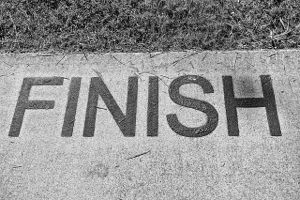Here’s a question I’ve gotten from Writing and Wellness readers recently…
How do I take a project from beginning to end without losing it somewhere in the middle?
So how do we do that, exactly?
Getting to “The End” Means Getting Through the Dreaded Middle
I think most writers would agree that when we’re talking about making it to the end of a book, we’re talking about surviving the dreaded middle. We need ways to motivate ourselves to keep going when things get tough, as they always do somewhere between page 100 and page 250 or thereabouts.
Indeed, it seems the middle is what separates the amateurs from the pros, and the writers that can actually push through are those that are far more likely to make it to publication.
Since this is Writing and Wellness, I’m not going to talk about craft. There are a lot of other writing blogs out there that do a great job of helping you with theme, characterization, plot, setting, etc.
Instead, we’re going to talk about what goes on behind the scenes in the writer’s mind, body, and heart, and how we can better manage these things so that we can keep going.
 5 Ways to Get from “Once Upon A Time” to “They Lived Happily Ever After (or Not)”
5 Ways to Get from “Once Upon A Time” to “They Lived Happily Ever After (or Not)”
Below are five steps to help you power through the inevitable difficulties that will arise while you’re writing a book. The overarching message is this: stay tuned to your own responses and make corrections as needed to keep writing.
Imagine yourself as a coach for the creative “you” inside—the person who shouts encouraging messages of support or who lays down the law, according to what the circumstances require.
The key is to try to learn more about yourself as you go. If you can step back and see your own progress (or lack of it) with an objective eye, you’ll be better able to give yourself what you need to keep going.
 1. Treat yourself like an athlete engaged in an endurance event.
1. Treat yourself like an athlete engaged in an endurance event.
Writing a book is a long haul. Few people ever take on a project that demands such a sustained and focused effort.
It’s not only mentally exhausting, it can also be emotionally draining and physically taxing. All those hours spent in the chair (or even at a standing desk) take their toll on the body, and the emotional ups and downs tear huge holes in our confidence and well-being.
As you’re writing, watch out for fatigue. It may start to show up as aches and pains in your lower back, neck, leg, and wrists, or it may creep into your mind as the whiny inner child who just doesn’t want to work anymore.
You can choose to power through, but it’s not likely to sustain you through the entire length of the book. Realize that you are similar to an athlete—you have to keep your body and mind strong to make it through this endurance event. That means getting enough sleep every night, eating well, and exercising at least 30 minutes a day (an hour is better) no matter what!
These tasks may seem like they take time away from writing, but trust me—they will help improve productivity during your writing sessions. If you’re tired and worn out, you won’t produce your best work. Take care of yourself physically and your mental health will respond, too. Plus you’ll have more energy overall (particularly if you exercise daily), which you need to maintain the regular writing routine required to finish a book.
No athlete would forego training, and you shouldn’t forego exercise, sleep, or healthy eating. The more you can maintain these three activities, the less likely you will be to succumb to things like physical and emotional fatigue.
 2. Motivate yourself in a way that works.
2. Motivate yourself in a way that works.
Most people who embark on huge projects have some sort of motivation to do so. The boss assigns them the project, for example, and promises a bonus upon completion, or they take it on for the benefit of a family member, with the built-in encouragement that goes with that. Or they do it as part of a peer group, or as a joint business undertaking, and they have people around them helping them to succeed.
Writing a book, on the other hand, is often a very solitary endeavor, and the only one around to really motivate you is yourself. Your significant other may offer a heartfelt “great, keep going!” every now and then, but on the other hand, he or she may (understandably) resent all that time you’re spending alone with your computer.
That means you need to be your own cheerleader, and that’s not as easy as it sounds. Telling yourself “good job” now and then can help, but what you really need to understand is your own personal motivation style. You can find yours is in Overwhelmed Writer Rescue, but for now, ask yourself: what do I really want to achieve with this book?
Are you hoping to make money with it? Influence people? Win an award? Or do you simply want the satisfaction of doing it?
Use your desire to push yourself along. Post reminders around the house and in your writing nook about “why” you started writing this story in the first place. Set deadlines and reward yourself when you reach them. Put images on your wallpaper that represent your goals. Share what you hope to accomplish on social media, and let your writing friends keep you on task.
Try to find new ways every day to motivate yourself to keep going. You are the teacher, the coach, the boss, all wrapped up in one. Take your job(s) seriously.
 3. Employ your inner drill sergeant.
3. Employ your inner drill sergeant.
There are going to be times when you need a cheerleader, and times when you need a drill sergeant. Writing takes work—an enormous amount of it—and we all feel that resistance somewhere along the way. When your inner child starts whining about all the work that you’re doing, it’s time to tap into your inner military officer.
Whining is a natural human response. We want things to be easy. (So why did we choose writing?) You’re going to have to grit your teeth and force yourself into the chair sometimes. It’s just the way it is.
The good news is that once you get into the story, you’ll feel happy again, simply because writing probably makes you happy. If not, at least you’ll feel good that you’re getting some words down. The trick is to remember that the discomfort typically lasts only five minutes or so.
If you’re whining a little (and you know when you are), respond as that drill sergeant, grab yourself by the shirt collar, and plop yourself in front of the computer. “You’re going to finish this project, and that’s that, so get busy!”
If you have to, promise chocolate after 500 words.
 4. Seek out inspiration—again and again.
4. Seek out inspiration—again and again.
You were probably inspired by something when you got the idea for your story in the first place. We often pick up inspiration from the world around us. It could have been an image, a memory, something you read or saw, a particular setting—the possibilities are endless.
You can’t rely on that initial inspiration to get you through the entire process of writing the book, though. You’re going to need more along the way. That means you need to seek it out, regularly.
When your motivation and energy start to wane, start looking around for new inspiration. There are many places where you may find it. Maybe you need to take a day trip to a nearby location, or visit an area that is similar to the setting in your book. A writer’s conference is often inspiring, as are book signings with your favorite authors.
A vacation may be what’s needed, or a new craft book that would help you tear apart what you have so far so you know where to go next. (I recommend Blueprint Your Bestseller by Stuart Horowitz as a good one for this.)
Movies are often inspiring for me. I love the ones that leave me thinking long after I’ve left the theater. They put me into a pensive mood, so I’ll drive around for awhile just letting the effect “live” in my psyche. Invariably, when I’m in this zone, something will pop through about the book I’m working on. It will be totally unrelated to the movie, but will rise to the surface because I was in that more creative, alpha-wave brain state that encourages creative ideas.
Find what works to inspire you, and use it regularly. Don’t be afraid to indulge your creative muse. Soak up what you need so you can continue to deliver your best work on the page.
 5. Get back in touch with how you feel.
5. Get back in touch with how you feel.
There are going to be times when you’re tempted to throw in the towel. Novels can be crazy-making, and there will come a day when you’re convinced that everything you’ve written is crap and there’s no sense in continuing, because all you’re doing is wasting your time.
When this time comes, you must do two things:
- ignore your emotions about the story and keep writing, and
- get back in touch with how you feel about the story.
When your doubting brain starts going on about how horrible the story is, your best approach is first, to ignore it as much as you can. Keep writing every day. Keep adding up the pages. Let the doubting voice go on but don’t feed it. Don’t nurture it. Realize that it’s completely normal at this stage, and like wind in a storm, it will eventually pass.
Then, get back in touch with how you feel about the story. We all have a place in our hearts where each story lives. Usually when we’re struggling with the middle, we lose touch with that place, and begin to see the story more with our heads than with our hearts.
I’ll give you an example. The novel I’m working on now has been really difficult for me—my hardest project yet by far. When I get that feeling that I should just give it up, I return to the place where my love for the story lives.
I could point out the place to you. It’s near my heart, and when I connect to the core of the story that way, I can feel a physical reaction there. It matters to me, and when I remind myself of where it lives, I can feel again that connection and the last thing I want to do is abandon it.
You have a love for your story, too. When it gets hard, take a moment to reconnect to that love, and remind yourself of why you started the story in the first place. Have faith that if you keep going, you will finish it—and that it’s meant to be finished.
 Remember: Finishing is Important No Matter What
Remember: Finishing is Important No Matter What
One more thing to keep in mind: finishing the book is most important, no matter how “good” it is.
We are poor judges of our own work, and should put all judgment aside until we’ve written “the end,” because finishing is a benefit in itself. Whether or not the book ever sees publication is another matter. Writers need to practice finishing their work if they expect to learn how to finish.
In my early years of fiction writing, I didn’t think about it this way. I figured if the story wasn’t going anywhere (according to me), then it wasn’t worthwhile finishing, and I should spend my time starting a new story that had more promise.
Silly me. I’m a lifelong musician—I should know the value of practice. But somehow I thought as long as I was writing I was practicing.
There’s a big difference between writing a chapter, however, or a scene, and writing a book. If we want to be novelists, we have to practice writing books, not chapters, and that means going all the way to the end.
A new story always seems to have more promise because it’s new. It’s not until we’ve lived with it awhile that we realize that shucks, this story is going to present some challenges, too.
They all do. That’s why we must do whatever we have to do to finish the project we’re on. Just finish it. Ignore the negative voices, stick with your writing routine, and finish. You need the experience of writing the entire book, not just half of it.
Getting through this book is your best bet to learning what you need to learn to get through the next one, so don’t stop. Keep going, even if it’s a mess. As any toddler eating spaghetti will tell you, even a mess can be a lot of fun.
How do you get from the beginning to done?
Read more about your personal motivation style in “Overwhelmed Writer Rescue.” Order the book on Amazon (or anywhere books are sold), and get your FREE chapter here!


I love the comparison to an endurance event – that’s what I’ve been using lately in my blogging ventures. I like using the analogy that I’m laying the groundwork now and I’ll never get where I want to be if I don’t put in the miles, just like I did when I ran a marathon a few years ago. I hadn’t thought that was possible either, but when you put in the work, you can do anything!
Great comparison, Michelle! You’re so right—and congrats on the marathon. Yes, a little action every day—brick by brick!
I needed to hear this and it will certainly be a good way to complete and redo my 2nd draft. The inner drill sergeant needs to goad me forward to make my words count!
Second drafts can be daunting no doubt. Here’s wishing you drill sergeant statements when needed. I’ll start: “You wanna rest? There is no resting around here! There’s only writing so get to it!” :O)